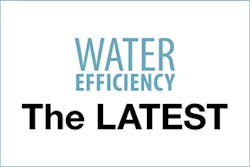State Water Board Adopts Regulations for Augmenting Reservoirs with Treated Recycled Water
Providing local water suppliers with a new tool to improve their drought resilience, the State Water Resources Control Board today adopted water quality and other requirements to ensure the safe use of treated recycled water to augment surface water supplies.
“Cities and counties around the state are looking to stretch their local water supplies in the face of an increasingly uncertain water future,” said State Water Board Chair Felicia Marcus. “Water efficiency and reuse are the smartest ways to help our water resources go further. Today’s action is another important step in expanding the sensible use of recycled water in California.”
The new regulations set requirements for the quality of treated recycled water that can be added to a surface water reservoir that is used as source of drinking water. The regulations also specify the percentage of recycled water that can be added and how long it must reside there before being treated again at a surface water treatment facility and provided as drinking water.
Adoption of the regulation went through a public process of review and comment over two years, including an independent scientific review and guidance by an Expert Panel created in 2014 to assist the State Water Board in developing regulations for recycled water. The panel determined the surface water regulations adequately protect public health.
In addition to water quality requirements, the regulations also require local water systems to engage the public in developing “surface water augmentation” projects. The regulations recognize that public education and maintaining public confidence in their water supplies are essential parts of a project’s success.
Today’s action is the board’s latest effort to develop uniform statewide rules allowing for the expanded use of recycled water to indirectly supplement existing drinking water supplies. In 2014, the State Water Board set requirements for using treated recycled water to recharge groundwater. The same year the board adopted statewide rules for outdoor uses of recycled water and for irrigating crops.
The State Water Board is also working on regulations for “direct potable reuse,” in which treated recycled water is added directly into a drinking water system or into a raw water supply immediately upstream of a drinking water treatment plant. These rules are expected by 2023 after further research, expert consultation and public engagement to ensure the regulations protect public health while increasing drinking water supplies.
As California faces more severe and frequent droughts due to climate change, as well as the pressures of a growing population, water recycling is part of a portfolio of state strategies for building local self-reliance and providing more sustainable, reliable water supplies, as outlined in Governor Edmund G. Brown Jr.’s California Water Action Plan.
Today’s approval of regulations for surface water augmentation streamlines the process for drinking water providers to diversify their water sources, in order to provide a relatively reliable, drought-resilient, and sustainable option for supplementing the water in a surface water reservoir that is used as a source of domestic drinking water supply.
Senate Bill 918 (Pavley, 2010) and SB 322 (Hueso, 2013) directed the State Water Board to investigate the feasibility of creating regulations for direct and indirect potable reuse. The State Water Board continues to support the wise utilization of all our water resources and recycled water is an important part of California’s water portfolio.
Last year, the State Water Board funded more than $748 million worth of water recycling projects using Proposition 1 grant and loan funds, and low-interest loans from the Clean Water State Revolving Fund. These projects are projected to add 44,980 acre-feet of recycled water per year to California’s overall water supply portfolio.
